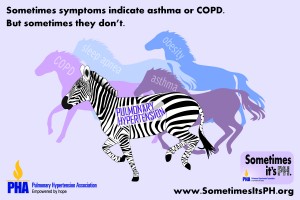Category Archives: Events
Uniting Behind the Zebra for Early Diagnosis of PH
December 3, 2012by Mollie Katz, Vice President, Community Engagement, Pulmonary Hypertension Association.
Since last June, zebras have been the hot new symbol of pulmonary hypertension (PH).
PH patients, families and caregivers around the world have rallied behind the zebra,
building its stripes into their fundraising events, posting photos of themselves in zebra
clothing and talking about the zebra in media interviews about PH. At conferences of
PH-treating professionals, zebra-striped buttons are being given away and participants
are buzzing about “the zebra campaign.”
Why?
 Among doctors, the zebra is a metaphor for an unexpected diagnosis. That’s why the Pulmonary Hypertension Association (PHA) has made it the symbol of a new 5-year initiative on the importance of considering a PH diagnosis early on. The campaign, Sometimes it’s PH, responds to a major problem — frequent misdiagnosis — by teaching health care professionals to suspect PH, screen for it and team with PH specialists to provide the best possible care.
Among doctors, the zebra is a metaphor for an unexpected diagnosis. That’s why the Pulmonary Hypertension Association (PHA) has made it the symbol of a new 5-year initiative on the importance of considering a PH diagnosis early on. The campaign, Sometimes it’s PH, responds to a major problem — frequent misdiagnosis — by teaching health care professionals to suspect PH, screen for it and team with PH specialists to provide the best possible care.
The zebra image strikes physicians immediately, because it comes straight from
their medical education. When they first learn how to reach a diagnosis, they are
taught, “When you hear hoof beats, think horses, not zebras.” In other words, doctors
learn to assume that common symptoms suggest common diseases. But with a rare
disease like PH, widespread symptoms such as shortness of breath, chest pain, fainting
and fatigue point to a “medical zebra,” similar to a horse, but very different.
Sometimes it’s PH pairs the zebra with this message to medical professionals:
Sometimes shortness of breath, chest pain and other symptoms may lead you to
conclude it’s asthma, COPD, obesity or lack of fitness. But sometimes it’s not.
Sometimes it’s PH.

The campaign aims to eliminate misdiagnosis of this illness, whose symptoms are often mistaken for other diseases. Many patients are misdiagnosed repeatedly over several years. Research shows that almost 75 percent of patients have advanced PH by the time they are diagnosed. That number has scarcely changed since the 1980s. While continuing to work toward a cure, promoting early diagnosis is PHA’s next big priority for improving patient care.
Sometimes it’s PH, led by PH-treating professionals, will educate other professionals
about PH, starting with primary care providers, the first ones patients turn to with symptoms, and later reaching specialists and likely patients. PHA will highlight its own educational programs on early diagnosis; pursue new educational programs outside PHA; communicate through medical journals, media coverage, and more; and it will connect with other groups of medical professionals to carry the early diagnosis message to their members.
Already PHA has highlighted early diagnosis in the summer issue of its medical
journal, Advances in Pulmonary Hypertension; made it the theme of its successful
PH Awareness Month in November; and has offered a webinar for professionals and
patients on the subject during PH Week at the American Thoracic Society. (The journal
and webinar will be archived at www.PHAOnlineUniv.org, PHA’s hub for medical
education, if you’d like to catch it.)
Want to unite with others behind the zebra? Show you endorse the campaign at
www.SometimesitsPH.org. Share your own misdiagnosis stories and zebra photos
there. The site also lets you view a 1-minute video spot and gives tips on sharing it
through social media. Every step strengthens our cause.
Jewell’s Story
October 5, 2012I would have to say my situation started back in the ’90s. I was experiencing a shortness of breath and would be sick with bronchitis a lot. I decided to go see an allergist and he put me on shots, I took them for about 10 years. It did help me but I still had the shortness of breath. My internal medicine doctor back then decided to do a chest x-ray and when she saw the results she decided to send me to a Pulmonary Specialist.
They diagnosed me with mild asthma and also did a lung biopsy. They said I had scar tissue on my lungs but never really told me how bad it really was. I was treated by this doctor for a number of years with steroids, antibiotics and breathing treatments. As the years went on I became sicker more and more often. I would have periods in which when I would cough I would black out for a few seconds, however the doctor didn’t make a big deal about it.
Fast forward to 2010, I started to have a lot of weakness and fatigue. One day while driving home I began to choke on some water and I blacked out while driving. When I came to I was making my way over to the next lane on the interstate. I know that the Lord was with me that day because otherwise I would not be talking to you today. I didn’t go to the doctor until about a week or so later when I began having severe headaches and weakness. I thought it maybe was a toothache so I made an appointment with the Dentist.
On the day of the appointment, I had to climb a flight of stairs and by the time I got up those stairs I was gasping for breath. My dentist told me he would treat me for my toothache but he said I needed to see a doctor becayse he believe I had something very serious going on, pointing out that my hands were blue!
I called my Internal Medicine doctor and she ordered tests on my heart and blood tests. They would not let me go home because of the severity of my condition. They also conducted a CT scan of my lungs. The doctors came in and told me I had Pulmonary Hypertension.
They immediately started me on medicine (this was in July of 2010) and then in October of that same year I started to see a pulmonologist who put me on medicines related specifically to Pulmonary Hypertension. I am now also on oxygen pretty much all the time and I am doing Pulmonary Rehabilitation to help build up strength and endurance for my body.
It has been very encouraging and inspiring to do. I would like to say it has affected my life in many ways. It has affected my physical relationship with my husband who does not always understand and who is also dealing with his own health issues. It has affected my daughter and grandchildren as they were very worried about me. But, I am a fighter and refuse to give up because I know my Lord Jesus Christ is my healer, my rock and my shield and He will heal me.
I would like to say to all who are battling this disease or anyone who has a loved one who is battling it, to always support them, love them and pray for them and know that the Lord is with you and with them. I hope that I have been able to help or encourage someone today.
Posted in Diseases, Events, Featured, Media Center, Uncategorized | Tagged Asthma, Pulmonary, Pulmonary Hypertension, Shortness of Breath | 6 CommentsLee Ann’s Story
September 17, 2012It was the third week that my ankles had been swollen consistently. That Wednesday, May 16, 2012 my mother and husband convinced me that an ER trip was necessary. The swelling had come and gone over the past 3 months. As a 41 year old mother of two teenagers, an asthmatic and someone who was overweight, I chalked the swelling up to being heavy. The shortness of breath had been there for years and again, I chalked that up to being heavy. Then I started to notice chest pain with the swelling and shortness of breath. That was when I realized that this might be a little more serious than I thought.
At the ER, the initial thought was that I had had a heart attack. Then blood clots then eventually, the final diagnosis… Pulmonary Hypertension. The language was not new to me or my family as my niece was born two short years ago with PH.
After a whirl of tests and a week-long hospital stay, I was discharged with little knowledge other than what I had learned from my niece. A Cardiac Cath was done and with this I was introduced to my now Pulmonary Doctor whom I love. Now the diagnosis was worse. Pulmonary Hypertension and Pulmonary Veno-Occlusive Disease.
I was told that after 5 years I would have a 50% chance of living without a double lung transplant. My world just stopped. Here we were a family of four making good money and living a great life. I had to quit my job and file for Social Security Disability. I had to deliver the news to my husband and boys that I was going to die.
Here it is four months later; I have had an open lung biopsy and have been taking medications that make my symptoms worse. The money situation is so bad, we’re making enough barely struggle by, but not enough to live. I was approved for disability but have a $5000 out of pocket deductible with my husband’s insurance. Not to mention copays and script costs. Disability wont start until December 26, 2012 and Medicare wont start until May 2014.
Stress is bad, I find myself crying all the time. I try to put on a happy face but it is so hard to ask for help, watch my husband come home tired from work and do housework and cook because I cannot.
Everyone keeps saying it will be ok, my question is ok for who? I have not yet learned to deal with my illness and pray that soon I will see that I can survive.
Thank you Caring Voice Coalition for all you do everyday.
Posted in About Us, Diseases, Events, Featured, How We Help, Media Center | Tagged CVC, Medicare, Pulmonary Hypertension, Pulmonary Veno-Occlusive Disease, Shortness of Breath, Swollen Ankles | 8 CommentsHave You Seen CVC’s Community Magazine?
April 26, 2012We told you last week about Community, CVC’s new magazine. If you haven’t received your copy yet, here’s what you missed!
In late January, I traveled to downtown Manhattan with the sole intention of taking pictures of Dennis Stavropoulos at Ground Zero. I had met and spoken with Dennis several times, including conducting two phone interviews for this story. I had talked to him at great lengths about his time as a detective with the New York Police Department. About how he, and the rest of city’s responders, had been dispatched to lower Manhattan after two planes flew into the World Trade Center buildings. His story, while harrowing, was missing context—it was missing the accuracy of visual imagery. So I proposed that we meet, visit the 9/11 Memorial, and reminisce, which he was fine with, until the day came.
“We were down there to do a job.”
I met Dennis on the corner of Albany and West Streets, directly across from the Memorial. When he showed up, his obvious anxiousness made it clear that he did not want to go in. He’d been there. He’d seen it. He’d stood beneath the tower that looked like it had “been hit by Godzilla.” He had witnessed. He had worked. And he had no interest in going back. How, or why, could I argue with him? What he soon proposed was an impromptu tour of New York City and its surrounding boroughs. New York through his eyes. I’ve been to New York dozens of times, but as I soon learned, you haven’t seen New York until you’ve seen it through the eyes of a New Yorker.

Dennis Stavropoulos was born and raised in Brooklyn, New York. He grew up as a part of what he describes as the final stickball generation. A neighborhood boy. And as we walk around the streets he was raised in, he describes the “true” New York from his youth. The French Connection New York – with the subway cars tagged heavily in graffiti. The Son of Sam New York – when members of the neighborhood put aside their differences to combat a local terrorist. The Taxi Driver New York. “Taxi Driver is the New York from my childhood,” he said, in his deep, purposeful Brooklyn accent. “You’d walk down 42nd street and you’d see it all: the X-rated theaters, the casual drug use, the casual theft. Now there’s a Disney store on 42nd street. It’s a very different city today.”
It’s interesting to hear Dennis relate his early years to so many different films, because that is exactly what his latter years reflect: the framework of an influential motion picture.
New York Undercover
When he was 21—after high school and a bit of college—Dennis became an EMT based out of Bellevue hospital, responding to shootings, overdoses, baby deliveries, you name it.
After six years, he joined the police academy on a whim of encouragement from some of his friends who were doing the same.
“I went undercover…I mean REAL undercover.”
“Joining the police department wasn’t really something I had always thought about,” he said. But soon after graduating from the police academy, he was walking his own beat— responding to calls, taking reports, making arrests, and so on.
Looking to make a career out of the NYPD, he transferred to narcotics, which he describes as a dangerous but exciting way to move up in ranks within the department.
“I went undercover, not just in plain clothes, I mean real undercover,” he said. Walking past Washington Square Park, for example, he tells me how he used to buy crack from drug dealers in the park, and watch from afar as police would raid the park moments later. “That was the job – setting up drug deals, working the players of that culture.”
In 2001, after he had made detective for “flourishing” as a narcotics officer, his undercover assignment ended. And then it happened.
Complete Chaos
 On the morning of Sept. 11, 2001, Dennis was assigned to work an election poll in uptown Manhattan. When news broke that a plane had hit one of the towers, Dennis waited eagerly for instructions from his command. Then the second plane hit. Then the first tower fell. Dennis closed down the poll and was ordered downtown.
On the morning of Sept. 11, 2001, Dennis was assigned to work an election poll in uptown Manhattan. When news broke that a plane had hit one of the towers, Dennis waited eagerly for instructions from his command. Then the second plane hit. Then the first tower fell. Dennis closed down the poll and was ordered downtown.
“By the time I got down there, the entire city was covered in a thick, dark cloud of smoke,” he said. “There was a layer of debris in the streets, people were running, screaming everywhere. It was complete chaos.”
Upon arriving downtown, Dennis was assigned to help secure the site, which he continued to do for several weeks following the attacks. For months after, Dennis worked on a landfill in Staten Island, sifting through the debris of the World Trade Center.
“You just have to keep doing what you’re doing.”
“We found everything at the landfill,” he said. “Bones, body parts, wallets, firearms, bullets, office supplies—everything. I didn’t really think about the bigger picture of it all while I was there.”
It is because of his time cleaning up debris downtown and at the landfill that Dennis remains averse to visiting Ground Zero.
“It’s difficult to explain,” he said. “We weren’t down there working as heroes. We were there to do a job. We worked at least 16 hours a day, digging up everything you can imagine. We didn’t reflect or pause. We worked.”
Every night, he’d go home and wash the dust out of his eyes and ears, and blow the dirt and grime from his nose. He’d sleep whatever few hours he could, wake up, and do it all over.
Jump ahead eight years, and Dennis, now working in the medical examiner’s office, became very ill, very quickly. Breathing had become more difficult, and his level of energy was often flat lined.
“I was always healthy. I could do anything,” he said. “I was very active. I played on the softball team at work, I was always a golf junkie; but in 2009, things had really gotten worse for me.”
After several visits to the doctor, Dennis was diagnosed with pulmonary hypertension, a disease that causes abnormally high blood pressure in the arteries of the lungs. The disease, which currently affects nearly 30,000 Americans, is often fatal, and has yet to be issued a cure.
“When I left the hospital after being diagnosed, I was told what I had, but I wasn’t told the full extent of it,” Dennis said. “So I went home and started researching online, and that’s when I realized how fatal this disease is.”
After jumping through the many hurdles of health insurance bureaucracy, Dennis finally found a specialist that not only accepted his insurance, but that he trusted as well.
“Finding a specialist was a very difficult process,” he said. “But the cost of finding one you trust makes all the difference.”
“…That’s when I realized how fatal this disease is.”
Dennis has been taking a medication that helps combat the symptoms of PH since early 2010, which he says has greatly improved his overall well being.
“Life is harder now, there’s no question,” Dennis said. “If I don’t think and I start doing something physically demanding, I’m soon reminded that I can’t do that. And although I have to take everything a little bit slower, I see such a difference with that drug.”
When asked if his pulmonary hypertension is directly related to his clean-up work post-9/11, he responds directly, nobly. “I certainly was breathing in a lot of dust and toxins,” he said. “I know other people with PH who also have other issues—emphysema, sarcoidosis, things like that. But my pulmonary hypertension stands alone, and the doctors don’t exactly know why. It would be presumptive of me to say 9/11 caused my PH, but it would seem plausible.”
Moving Forward
Today, Dennis lives in Staten Island near the base of the Verrazano-Narrows Bridge, or “the Saturday Night Fever bridge,” as he often calls it, working restricted duty for the medical examiner’s office. On days he has appointments with his doctors, he takes the 25-minute ride on the Staten Island Ferry to downtown Manhattan. On those days he likes to walk around the city, taking it all in, thinking, remembering.
He’s thought about leaving the city when he retires, but he can’t decide whether the demands of the hustle and bustle outweigh its excitement.
When he isn’t working, he plays golf when he feels up for it, eats slices of square pizza in Brooklyn with his friends, and checks in on his parents every weekend. While watching the sunset from his apartment balcony, I ask him, if the medication helps restore some of his physical strength, where does he find the emotional strength to carry on? Given all he’s seen and been through, what makes it worth it?
 “You just have to keep doing what you’re doing,” he said frankly. “You have to get to work to pay the bills. When you’re diagnosed with something and considered disabled, it’s easy to get down. There are good days, and there are bad days.”
“You just have to keep doing what you’re doing,” he said frankly. “You have to get to work to pay the bills. When you’re diagnosed with something and considered disabled, it’s easy to get down. There are good days, and there are bad days.”
“But you have to wake up. You have to keep moving.”
By constantly moving, Dennis’ story continually evolves. The old maxim states that every New Yorker equally loves and hates the city that never sleeps. Dennis would love to move away, but he’d hate to be far from his family. He’d hate to leave the energy, but he’d love to be somewhere warm. What will be next in this life filled with such cinematic virtues? I’m not sure. I guess we’ll have to wait for the sequel.
By Alex Withrow. As told to Alex and Taylor Scott. Photos by Alex. The story is all Dennis.
Posted in Caregivers, Diseases, Events, Featured | Tagged 9/11, Dennis Stavropoulos, Pulmonary Hypertension | 1 Comment













